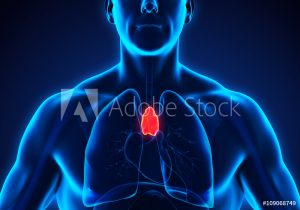Today, I wanted to share some information about how hypothyroidism is related to autoimmune diseases, like lupus, type 1 diabetes, and Celiac’s.
The most important piece of the puzzle: the thymus gland.This small gland sits right behind where your chest and neck meet.
What does the thymus gland do for us?

Essentially, its purpose is to make sure we have a strong immune system that responds well to foreign threats, like viruses and bacteria, but prevents our body from seeing our own cells as not our own.
Thyroid hormones play a very crucial role in how well our thymus gland functions. In fact, creating hypothyroidism in rats causes their thymus gland to shrink, which also means the thymus gland’s function goes down (Abou-Rabia & Kendall, 1994).
Here’s what the research shows:
- Autoimmune thyroid disease (i.e. Hashimoto’s or Grave’s disease) is much more common now than it was years ago
- Individuals with autoimmune thyroid disease are at an increased risk for developing other autoimmune conditions. The most common is rheumatoid arthritis.
- Individuals with hypothyroidism have lower thymus function
- It has long been believed that the thymus gland degenerates/shrinks as we age (it does). This means that its ability to function properly also decreases as we age. This is paralleled with slowed metabolism and thyroid function as we age.
- Thymus gland shrinking is also influenced by how good thymus gland cells are at protecting themselves from the damage of free radicals (Griffith et al., 2015).
What are free radicals?
Free radicals are small unhappy, unstable molecules that interact with other molecules in our body to become happy and stable. Free radical production is a normal part of the way our bodies work. They’re produced when we make energy.
Here’s a weird analogy for free radicals:
Imagine two people: Person A relies on a crutch to walk. Person B (the free radical) just broke his leg and doesn’t have a crutch. To stabilize himself, Person B takes Person A’s crutch right from underneath him. What’s the result? Person A becomes unstable. Person B is now stable.
Person A represents the cells of each of our organs, like the thymus gland and thyroid gland. Person B is a by-product of reactions that happen in our body.
Our bodies also have a built-in method to take care of free radicals. We produce things called antioxidants, which are responsible for neutralizing free radicals or stabilizing them. The most important antioxidant the body makes is called glutathione. Other antioxidants include vitamin C and Vitamin E.
However, the problem occurs when free radicals cannot be neutralized as fast as they are produced. This is called oxidative stress and it is one of the biggest contributors to chronic and degenerative diseases, like autoimmune diseases, cancer, heart disease, and neurodegenerative diseases like Alzheimer’s (Pham-Huy et al., 2008).
What does this mean for your thyroid gland and thymus? The higher oxidative stress your body is dealing with, the faster your thymus is to shrink. This combined with poorly managed hypothyroidism is a recipe for autoimmune disease.
Check out my next blog post to learn more about what you can do to reduce your risk. The Number One Diet Change You Need to Make to Reduce Your Risk for Autoimmune Diseases.
Are you interested in learning more about how nutrition can help improve your thyroid health? Let’s talk! Schedule a FREE information call HERE.
- Understand PCOS Sugar Cravings & How to Stop Them - March 24, 2023
- The 4 Types of PCOS – What You Need to Know - February 24, 2023
- 4 Reasons Not to Keto with Hypothyroidism - January 27, 2023

Pingback:The Number One Diet Change You Need to Make to Reduce Your Risk for Autoimmune Diseases | Hayat Nutrition